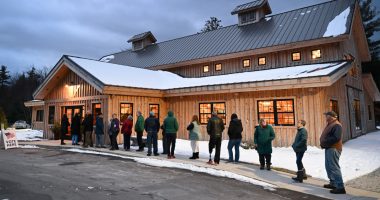If your understanding of Appalachia is rooted in watching J.D. Vance campaign for the Republican nomination in Ohio’s Senate race ahead of Tuesday’s primaries, reading his book “Hillbilly Elegy” or watching the memoir’s Netflix adaptation, you might not think it was possible for someone like me to exist — someone who was born and raised in the hills of West Virginia as the daughter of Indian immigrant parents, who is queer and who deeply identifies as Appalachian.
Vance’s rendering of Appalachia — a region that includes 13 states and 423 counties — does not include people like me. Ohio has 32 counties that are part of Appalachia, but Vance is certainly not courting the vote of anyone like me with his “Are you a racist?” campaign ad, in which he first mocks people who take issue with the bigotry directed at Mexican immigrants by many Republicans, then goes on to tout Donald Trump’s border wall as the solution to Ohio’s problems.
I urge Appalachians in Ohio to truly think about whether the narrative offered by Trump and Vance aligns with the values of community and acceptance that allowed my immigrant family to make a home in Appalachia.
He has painted the region as one rife with stereotypes: of people struggling with joblessness, poverty and addiction; of people whose downfall is their fault, or the fault of the immigrants who take their jobs, but certainly not the responsibility of the corporations or politicians who have abandoned them.
That is not the Appalachia I know or the one I grew up in. My Appalachia has been home to immigrants from all over the world. First, the Welsh and the Scots Irish; later Hungarian, Polish, Italian, Lebanese and Syrian folks. And when I was growing up in the ‘80s and ‘90s, Indian, Filipino and Chinese immigrants came to work in the chemical industry and health care professions. That’s how my parents ended up in the Kanawha Valley in the early 1970s. My father worked for Union Carbide, and our family was supported by close to 100 other Indian families who lived in the region, as well as hundreds of white and Black West Virginians who embraced us as friends and neighbors.
My Appalachia has always been home to Black folks: Prominent educator and leader Booker T. Washington was raised less than 20 minutes from where I grew up, author and scholar bell hooks took her first and last breaths in Kentucky, and NASA research mathematician Katherine Johnson went to college at the same place where my mom later got her degree. My Appalachia was home to the Battle of Blair Mountain, the nation’s largest labor uprising, in which Black and white miners joined forces to improve working conditions in the mines.
My Appalachia is home to gay folks and trans folks, to people who are Jewish, Hindu, Muslim, Zoroastrian, agnostic and atheist. My Appalachia is complicated. It is messy. It is nuanced.
But we live in a time when nuance doesn’t get people elected; playing on polarization does. Reducing people to stereotypes, pushing them further and further away from one another, is how Trump was elected president in 2016, when “Hillbilly Elegy” was a bestseller and frequently referenced as one of the books to read to help understand the election results. Now, Vance has used his celebrity to make a bid to be a politician in Trump’s mold — and the former president rewarded him for his efforts with an endorsement.
Recently on my book tour, I drove through Appalachia for the first time since 2019. I visited with friends and family, none of whom were surprised by Trump’s endorsement. As one of my uncles put it at dinner on the night I read in Charleston, West Virginia, Vance is an opportunist. People in Appalachia have known ever since 2016, when “Hillbilly Elegy” was published, that Vance will say what he needs to say in order to advance his own agenda, no matter who suffers as a result.
The people I spoke with in Appalachia are exhausted by the narrow vision of their community that Vance offers to the world. They want the world to see them more clearly: to understand that Appalachia is populated with people who are white and people of color, people who identify as straight and queer and trans, people who locate themselves as right and center and left on the political spectrum. To know that Appalachians whose families have lived in the region for 10 generations live alongside Appalachians who only arrived a generation ago. To see this part of the country, like every other part of the country, is complex and deserving.
Because the people of Appalachia overwhelmingly voted for Trump in the 2020 election, you might conclude that my assessment is false or that I no longer understand the place where I grew up. I am not confused about the fact that Appalachia has experienced an intense economic decline. Its effects are impossible to ignore. And I understand that people in the region are grasping for a narrative to make sense of the why behind that decline. It is human nature to seek an explanation when we are grieving. Politicians like Trump and Vance offer a narrative to make sense of the decline, but it is one grounded in exclusion and hatred. Ultimately, I believe that what people want even more than simplistic explanations are leaders who seek to understand, and concretely respond to, their lived struggles.
I urge Appalachians in Ohio to truly think about whether the narrative offered by Trump and Vance aligns with the values of community and acceptance that allowed my immigrant family to make a home in Appalachia, and to consider how their votes can help move the region forward in a way that does not reject those values.
And outside Ohio — in every one of the other 12 states that make up Appalachia — we can’t give a platform to leaders who use xenophobia and fear-mongering in order to get elected, or line their pockets with money from Big Tech, or prioritize conservative legislation inspired by the American Legislative Exchange Council over lawmaking grounded in the very clear needs of the people who elected them.
That said, countering all of this can’t just come from within Appalachia. It has to come from all of us — those within the region and those outside of it. We need to seek out different stories, challenge dominant narratives and acknowledge how the exploitation of Appalachian natural resources and Appalachian people has been used to make a tremendous profit for the wealthy elite. Politicians are not going to abandon their strategy of polarization unless we demand it of them.
People in Appalachia deserve so much more than they are getting from a mainstream narrative that reduces them to stereotypes, politicians who prioritize grandstanding over good governance and corporations that take their resources and leave them with poisoned air and water.
My Appalachia defies stereotypes. It deserves leaders who reject stereotypes.
Source: | This article originally belongs to Nbcnews.com











